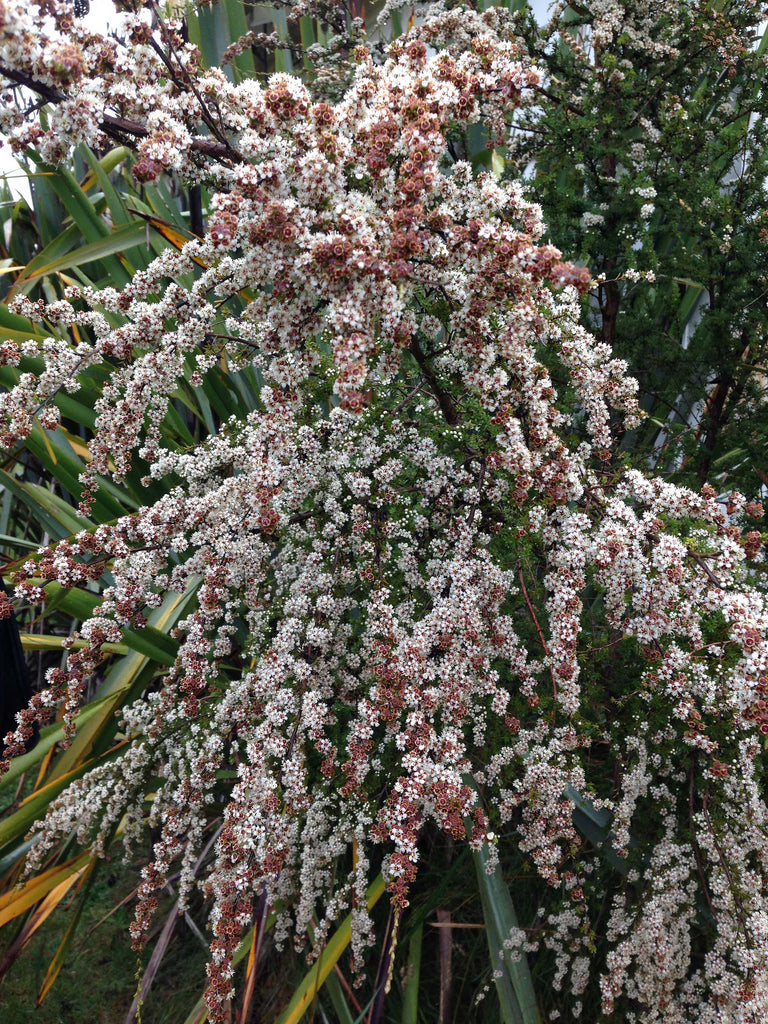What is kānuka oil and how is it good for you?

What is kānuka oil?
Kānuka essential oil is made by distilling leaves and twigs from the kānuka tree (kunzea ericoides). Kānuka is endemic to New Zealand, and is not found anywhere else in the world. It is often confused with mānuka oil - both mānuka and kānuka belong to the same family of plants (myrtaceae), however they are different in a number of ways. Click here to learn more about the differences between kānuka and mānuka.
Kānuka oil has a much sweeter scent than mānuka oil, and isn’t as well known or researched. At the moment, a social enterprise on the East Cape is conducting clinical trials on kānuka oil to test its effectiveness in treating acne, eczema, stress and anxiety.
It is a lighter oil than mānuka oil, thanks to a much higher concentration of alpha-pinene and other monoterpenes, and as a result it takes less time to distill. Most of the plant material used for producing kānuka oil is harvested by hand.
Health properties of kānuka oil:
The health properties of kānuka oil are quite similar to that of mānuka oil. However, kānuka oil does not contain triketones, and exhibits much higher levels of alpha-pinene. As a result, kānuka oil is thought to be less effective at destroying gram positive bacteria, and more useful for helping to control fungal infections.
Here are some of the useful health properties that kānuka oil exhibits. To learn more, click on the links to be redirected to where these claims are made:
- Aids memory - as an acetylcholinesterase inhibitor, alpha-pinene has been shown to help with improving short term memory.
- Antifungal - kills fungus and prevents further growth.
- Anti-inflammatory - reduces inflammation.
- Antimicrobial and antibiotic - kills microorganisms and prevents their growth. This is largely due to the alpha-pinene content.
- Antiseptic - prevents the growth of disease-causing microorganisms.
- Antiviral - effective at killing viruses.
- Bronchodilator - dilates the bronchioles, decreasing resistance in the airways and increases airflow to the lungs. This is largely due to the alpha-pinene content.
- Insecticidal - acts as an effective insect repellent.
- Muscle relaxant - great for use in massage. Kānuka oil contains light molecules that penetrate deep into muscle tissue.
- Pain reliever - kānuka oil is known to provide relief for mild pain when applied to the affected area of skin.

Kānuka oil uses:
Kānuka oil can be used for a wide range of purposes, and we are still discovering new ways that it can benefit your health. Here are some of the more common ways that people tend to use kānuka oil:
Clearing blocked airways - as a bronchodilator, kānuka oil is said to be useful for opening up airways and helping with normal breathing.
How to use: add 5 drops to a steam inhalation or mix with 1ml of your favourite carrier oil and rub onto your chest.
Relaxation and stress relief - kānuka oil is used in aromatherapy for it’s calming properties.
How to use: add a few drops to your diffuser, or place a few drops in the palm of your hands and inhale. Alternatively, add 5-10 drops to your evening bath or a steam inhalation.
Insect repellent - kānuka oil is great for keeping insects away, especially during camping trips.
How to use: mix 5 drops of pure kānuka oil with 1ml of your favourite carrier oil and rub into your skin.
Athlete’s foot and fungal infections - great for ridding the toes and other areas of fungus, and keeping infections at bay.
How to use: apply 1-2 drops directly to the affected area twice daily. Add 10-15 drops to a foot bath and soak. Keep applying for at least 5 days after visible signs of infection have subsided.
Immune support and deep cleansing - kānuka oil promotes a healthy immune system and is great to use during winter when there are lots of colds and viruses going around.
How to use: add 5-10 drops to an evening bath and soak.
Keeping acne at bay - much like mānuka oil, kānuka oil is also great for helping with the natural treatment of acne.
How to use: mix 10-20 drops with 10ml of a carrier oil (such as sweet almond oil), and apply sparingly twice daily until redness has subsided and acne has cleared. Alternatively, try in combination with East Cape mānuka oil.
Helping to reduce dandruff - kānuka oil is great for soothing and nourishing the skin and hair.
How to use: add 2-3 drops of pure kānuka oil to a regular amount of shampoo or conditioner. Massage into your hair and leave for 5 minutes before washing out.
Various sources also claim that kānuka oil is useful for treating diarrhea, eczema, psoriasis, body odour and more. Have you found kānuka oil useful for other purposes? If so, please let us know - we would love to hear from you!
Next topics:
Disclaimer: These statements have not been evaluated by the Food and Drug Administration. These products are not intended to diagnose, treat, cure or prevent any disease. This information is provided for educational purposes only.
